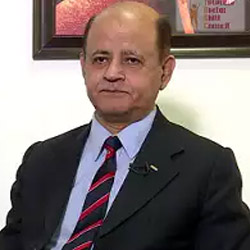
There are lots of hope from expectations from the Finance Minister Nirmala Sitharaman and Union Budget 2021. Finance Minister Nirmala Sitharaman has promised a never before like Union Budget as the Modi government looks to give a further boost to Indian economy ahead.
Minister of State for Finance Anurag Thakur and senior officials of the finance ministry on Saturday participated in the symbolic 'Halwa Ceremony' that marks the beginning of compilation of budget documents. Union Budget 2021 is scheduled to be presented in Parliament on February 1, 2021.
The unprecedented Covid-19 pandemic has; without doubt; adversely impacted world economy at large. Almost every industry has borne the brunt and MSMEs are severely affected with many closing down, probably permanently. However, IT & ITeS sector has seen spike in growth across some industry verticals in the wake of the pandemic. Retail industry came to a virtual standstill during the pandemic and was one of the worst-hit sectors. The cascading effects impacted the entire value chain that serves the industry.
Many are expecting on the rigid regulatory compliance and tax burdens should be revised, which can provide impetus for growth and expansion. This will increase hiring and businesses can largely contribute to the GDP. Revised tax policies, less complex GST structure and relevant policies that provide thrust for digital innovation can incentivize home-grown start-ups and brands.
The government can’t raise taxes across the board because the pandemic has hit the poor and middle income group below the belt. It may increase taxes in certain categories and will have to depend largely on non-tax revenues and market borrowings for the post -Covid-19 reconstruction of the economy.
However, many experts believes that, the economy is on huge crisis and it can’t be move further without an increased government spending and the government spending can only revive an almost muted demand as also the private investment and business sentiment.
 Arvind Chandrasekar, Director, Regulatory Affairs and Government Relations, AMD India
Arvind Chandrasekar, Director, Regulatory Affairs and Government Relations, AMD India
“One of the critical resources during the pandemic has been the use of computing technologies to ensure continuity. From online schools to the use of High Performance Computing (HPC) for vaccine discovery - computing devices have proven how the disruption brought about by the pandemic can be bridged with the use of technology. AMD hopes the government accords higher spending to provide students with computers which have now become a critical learning resource.
In addition, the need to expand investments in private/captive HPC infrastructure came to light during the pandemic. From banking services to healthcare, from retail to weather prediction for agricultural productivity, large HPC cluster deployments ensured a smoother transition to digitisation during the pandemic. AMD believes efforts by the government to highlight the significance of HPC from a business need to a national asset, such as according ‘infrastructure status’ to private clouds will help Digital India percolate outside government services.
A number of studies have demonstrated the multiplier effect on economic growth, unlocked by investments in HPC. We believe, schemes to fund and facilitate affordable access to HPC resources for startups will rapidly accelerate India’s ability to scale innovations across agriculture, energy, electronics manufacturing, and pharmaceuticals. Additionally, tax incentives that reward substantial datacenter investments will spark a virtuous cycle across India’s IT demand and supply.”
 Shibu Paul, Vice President- International Sales, Array Networks
Shibu Paul, Vice President- International Sales, Array Networks
"The World Bank has estimated that India's GDP will contract by 9.6 percent Fy 2020-2021, this is based on a sharp decline in household spending and private investment. Keeping this in mind, the government should emphasis on reviving the country's economy. With vaccinations being distributed across the country and declining Covid cases, businesses are set to make a comeback, but that comeback needs to be facilitated by the government by pumping more funds to keep the businesses running. The government has initiated many measures to counter cybersecurity concerns, more funds need to be allocated to fight cybercrimes which will only increase in number with the digital boom. The government needs to focus on creating strong domestic manufacturing policies favouring global companies to invest more in India. We would require the government to create policy frameworks that incentivize investments from big players in manufacturing locally in India. The government should provide a strong thrust for core R&D investments as part of its 'Make in India' initiative. The government needs to come up with practical tax slabs and custom duties for advanced networking and security products as these products will now more than ever be of importance especially with the digital India push and remote working relaxations. We expect the import/export process to be made digital and transparent so as to have an efficient RMA system for customers. There should be clear actions, policy and reforms to promote latest technologies like AI, IoT, Zero Trust, Machine learning, 3D printing, blockchain and simultaneously ensuring training facilities for all the mentioned technologies as part of skill development. The government has already given a huge push towards electrical vehicles, but there needs to be a planned allocation and execution of this project as we need to consider the implications of not conserving our surroundings."
 CP Gurnani, MD & CEO, Tech Mahindra
CP Gurnani, MD & CEO, Tech Mahindra
“2020 has been an unprecedented year and we hope that the upcoming budget will address the challenges faced by businesses and propel the economy towards faster recovery and growth. Digital technology and connectivity continue to be the cornerstone of India’s growth and leadership. The pandemic accelerated the shift to digital and we need to maintain this growth momentum, as it will have a cascading effect on creating efficient businesses, new jobs and all round development. R&D (Research and Development) spending must be increased in order to accelerate digital transformation and jumpstart education with focus on next-gen technologies, skilling, reskilling and upskilling programs, to nurture our young talent pool and thus accelerate our journey towards an ‘Atmanirbhar Bharat’ (Self-reliant India). We also hope to see focused initiatives to boost consumer sentiment, accelerate infrastructure development, move towards a lower interest rate regime and increase investments in key areas including healthcare and education. From an IT (Information Technology) perspective, we expect the government to create a fund for product companies along with extended SEZ (Special Economic Zone) benefits in the new normal of remote working, besides nurturing an ecosystem for deep tech startups in areas including blockchain, artificial intelligence, augmented reality and virtual reality. India is on the path of a higher growth trajectory and the vision of a $5 trillion economy can be achieved with focus on economic growth and development.”
 Rajiv Bhalla, Managing Director, Barco India
Rajiv Bhalla, Managing Director, Barco India
“We expect the budget to act as a much-needed catalyst for boosting demand, curbing inflation and thereby reviving the economy. There is a need to undertake definite policy measures and provide fiscal stimulus to ensure financial recovery and spur economic growth, specifically across, sectors, like healthcare, EdTech, Infrastructure and Manufacturing. We are also hopeful that the budget will address measures essential for an accelerated digital transformation. This includes investment in R&D, automation technologies, skilling and development of a talent pool trained in digital age skills which will help accelerate the pace of development.”
 K. G. Prabhu, Chief Financial Officer, Digisol Systems
K. G. Prabhu, Chief Financial Officer, Digisol Systems
"COVID-19 pandemic and the consequent lockdown had a drastic impact on the Indian economy in 2020, however everyone is hoping that the upcoming budget will improve the situation for the next financial year as India looks to recover from the economic devastation with the rollout of COVID vaccine. As last year the government focused on making India a self-reliant economy, thus, we are expecting that the upcoming budget will have measures to boost domestic manufacturing and introduce policies that will allow global companies to invest and manufacture in India.”
 Sudhindra Holla, Director, Axis Communications, India & SAARC
Sudhindra Holla, Director, Axis Communications, India & SAARC
“We believe that a sharper focus on investments in automation of physical security systems in the defence sector will be critical with the increasing focus on border security. We are very optimistic that the funds that have been allocated for smart city initiatives will be renewed to further the implementation of advanced surveillance system that can bolster security for the citizens, especially for women and children. As business operations get back on track, we are hopeful that the Make in India policy will be more favourable so that a company like us can realign our policies to stay more relevant and conducive in the Indian market. This will help in more localization of our products and generating more employment. Reduction of GST rates and customs duties will in turn help to generate a higher deployment and proliferation of our products leading to enhanced safety and security.”
 S Sriram, Chief Strategy Officer, iValue InfoSolutions
S Sriram, Chief Strategy Officer, iValue InfoSolutions
"Union Budget for 2021-22 is going to be challenging and a critical one with fiscal deficit challenges on one hand along with the need to revive/sustain growth momentum across the board. Q1, Fy21 saw the biggest contraction by over 27% in GDP. Q2 was a good recovery moving H1 GDP to -11.6%. H2 GDP projection is estimated at 3.4% GDP growth implying Fy21 GD P numbers at -4.2%. Even before pandemic hit us, the GDP was decelerating steadily from 8.2% in Fy16 to 4.2% in Fy20 and now moving down to -4.2% in Fy21 which is an 8% fall in a year. Many small businesses have shut and many more have downsized in a big way leading to employment losses never seen in our history. The key need hence is to revive the economy, business and employment to drive consumption. Fiscal deficit worries need to be de-prioritized with a clear focus on growth revival and job creation.
Government has to lead recovery through CapEx both at central and state level. More money has to be put in the hands of business and people through direct and indirect tax cuts, to enhance spends. We have seen only corporate tax cut but nothing significant on personal and indirect tax side. Special incentive schemes need to be extended to businesses increasing headcount. Technology investments came as a saviour for businesses due to the sudden lockdown to manage the business continuity. With awareness at an all-time high on the need to go digital and online, Government has to incentivise technology adoption drive for all sizes of business in the near term to build resilience for managing possible second/third waves. The government also needs to take technology investments to overdrive mode for enhancing productivity, transparency and efficacy of its interface with business and people. Initiatives like 5G rollout needs to be fast-tracked with special focus around areas such as cybersecurity, AI, ML, IoT, Analytics, block-chain, etc. for a sustainable recovery with a view to keep India ahead in the coming years."
"Yes - there are pointers to a V-shaped recovery and are being talked about by the industry experts. But I would like to exercise caution and would say that to vehemently declare that we are on the path of a V-shaped recovery is slightly premature. Can we get onto a V-shaped recovery - surely yes. There are many reasons to support this - the fact that vaccines are now reality will bring in the much-needed confidence for the economy - we will see investments that were on a go-slow mode pick up steam, which will have a cascading effect for the positive on the economy. We have already seen 2 or 3 months of rising GST collections - they are surely tell-tale signs of a positive upward trend. But it is also a fact that India has lagged behind other emerging economies and that is where the budget needs to focus on - how do we work on the 'ease of doing business' part and the squeezed up liquidity situation for the Indian Corporates. Core sectors like steel, power, cement are still declined and this need to be spruced up with support in the budget, for these core sectors, recovery is very important for the overall economy to be in the growth model. The informal sectors which in essence have a big part in the Indian scheme of things also need to be looked into during the budget to ensure that this V-shaped economy that we are hoping for becomes a reality and India can benefit from the same".
 Sonit Jain, CEO, GajShield Infotech
Sonit Jain, CEO, GajShield Infotech
"With a strong push for Make in India, it was never been more exciting ever for companies making products in India for the World. This year, we would like the government to include tax exemption for companies making products in India and also for employees working in such companies. With data security being as important as revenue growth for companies, a policy framework to enhance the digital culture of India, by incentivising companies to build strong data security infrastructure will fuel further growth of India. Covid has shown how Work From Home is no longer a buzz word, but a necessity, we look forward that this budget accelerates spending in rural digital infrastructure, thus making work from anywhere a true possibility. This will not only ensure the development of our rural economy but also help in decongesting cities. All of this would require a workforce well equipped with the knowledge of latest technology, spending on education to boost research in universities will help build a nation with knowledgeable and intelligent future generation."
 Gurpreet Singh, Managing Director, Arrow PC Network
Gurpreet Singh, Managing Director, Arrow PC Network
"India ranks 63 in the World Bank's ease of doing business list featuring 190 countries. This is a testimony that India is a growing hub for investment, start-ups and MSMEs which is also witnessing a boom in the adoption of digital technology. But the upfront cost of adopting technology is also huge. The government needs to support organizations of various sizes with tax relaxations and subsidization which would lead to overall improvisation. To further facilitate the ease of doing business, the government needs to simplify various laws that are complicated and demotivate investors. The government should also look towards the reduction of personal income tax rates which would help the struggling economy and the people. With Covid-19 more and more companies have suffered irrespective of their sector and size, the government should support the businesses that are struggling to survive. The government should give more priority to the digital India movement that has gained momentum, especially in the past year. From remote working to digital shopping and interactions the growth has been tremendous, but to ensure this momentum is not lost due to lack of security and policies to protect the people, the government should come up with a robust cybersecurity policy. Tech companies that provide cybersecurity products and solutions should be given relaxations as more and more cybersecurity based companies are coming up in India."
 Dr. Ajay Data, Founder and CEO, VideoMeet
Dr. Ajay Data, Founder and CEO, VideoMeet
"The Union Budget 2021-22 is going to play a crucial role for the Start-up industries, as India being a developing nation has undergone massive changes during the pandemic year. There has been tremendous growth in indigenous Start-ups and Apps as the products and services proposed come not only with great potential, but also provide high utility value as per the changed lifestyle due to the prevalent WFH trend.
The support from government has to come in terms of making access to capital and incubation easier. The series of terms and conditions, documentation, must be planned and established in such a manner that they do not come across as an obstacle but rather accelerate the functions of these new-age businesses. Additionally, the organizations which have decided to completely go online must also be given special consideration, as they will be in need of working capital throughout their journey to be at par with traditionally established players.
Our honourable PM has been heralding the message of 'Vocal for Local'. I would expect govt. to give preferences for local products and services in procurement processes. An independent association for Indian start-ups that comprises industry players must also be encouraged to bridge the communication gap between government authorities and budding entrepreneurs."
 Lt. Gen. Dr. SP Kochhar, DG, COAI
Lt. Gen. Dr. SP Kochhar, DG, COAI
“The COVID-19 pandemic has illustrated the critical importance of telecommunications in enabling a digital economy. Despite the challenges brought by the pandemic and the ongoing financial worries, the telecom industry in India managed to contribute during the COVID-19 lockdown. Telecom services has evolved as the essential service like water and electricity, today it is not a vertical industry anymore, but contributes horizontally to running and stimulate the growth of other industries as well.
The telecom network in India covers more than 5,00,000 villages. Though the ARPU is under pressure, TSPs in India have managed to reach among the top contributors in FDI over the last two decades. The industry contributes nearly INR 58,000 crores p.a. to the government exchequer. With a total of INR 11.24 Lakh crores investment till date, telecom has emerged as the second-largest sector in terms of private investment in infrastructure. Since 2010, the industry has spent INR 3,68,000 crores in spectrum auctions alone.
In this challenging time, the industry also faces major upcoming expenses on Infrastructure up-gradation like Spectrum Auction, 5G introduction, Network expansion and fiberization, which is very critical for providing future communication services for nation-building and rising aspirations of the country.
The industry proposes the following recommendations:
Recommendations for the Budget 2021-22
1. Regulatory Levies:
Currently, the total License Fee (LF) having a rate of 8% of AGR is uniformly applicable to all licensees, of which 5% goes to the USOF and the remaining 3% is levied as License Fee (LF).
The industry believes that the current unutilized corpus is sufficient to meet the objectives of the USOF.
International benchmarks show that India’s LF percent is way above the world average. Given the above, the industry recommends that the License Fee is brought down to 1% from 3% at the earliest to cover admin costs by the DoT/Government. USOF need to be abolished.
In addition to this, the industry demands that the effective rate of the Spectrum Usage Charge (SUC) be reduced by 3% for all the TSPs.
2. Goods and Services Tax (GST)
a. Request for Removal of GST on License Fees, Spectrum Usage Charges and Payment of Spectrum acquired in auction.
Levy of GST on License Fees, Spectrum Acquisition Charges and Spectrum Usage Charge is compounding the operational challenges. Thus, the industry recommends that in line with the international practice, payment of regulatory levies made by telecom operators should be exempted from tax under GST.
Alternatively, at present, GST is being paid by the operators under Reverse Charge Mechanism (RCM). Input Tax Credit (ITC) arising out of this is creating a huge imbalance with outward liabilities. For industry, it involves the heavy cost of funds for compliance, whereas for the government, this is revenue neutral.
In the above context, GST would not be applicable on the LF, SUC, and Spectrum Acquisition Fee would extend a huge relief to the entire industry. Alternatively, permit payment of RCM on Government Services from Input Tax Credit (ITC) balance.
b. Refund of unutilized ITC of Rs 35,000/- Crs.
The current market dynamics has led to the accumulation of massive ITC. The credit would further increase with upcoming significant capital expenditure to further enhance customer experience and achieve the vision of a digital India.
The industry recommends suitable amendments in the GST law may be made to allow a refund of unutilized ITC. Alternatively, an unutilized amount may be applied to other government liabilities of operators.
3. Service Tax Exemption and Clarification
a. Service tax on “Right of Way (ROW)”
The DGGSTI across India has been pursuing for recovery of service tax on ROW service from central/ state governments and the development authorities in respect of the past contracts. To address this issue, in November 2018, the government allowed an exemption for Service Tax on ROW services by ‘local authorities. However, the industry recommends that the scope of the exemption be expanded to include ‘appropriate authority’ as defined in ROW rules in addition to the exemption granted to the ‘local authority’. In short, the Scope of Local authorities either need to be widened or the phrase need to be amended to include State or Central Government including but not limited to the Departments of State and Central Governments.
b. Service tax on AGR
Prior to the SC decision on AGR dues, the telecom operators were under a bona fide belief that only core revenues should form part of the AGR. Accordingly, the entire industry believed that LF and SUC were not required to be paid on non-core revenues. The said belief and practice were also in consonance with the order of the TDSAT passed in 2015.
Telecom Operators as a matter of general practice were making payment of Service tax on LF and SUC paid to the DoT and were availing full credit of the same. Levy of service tax today on the incremental AGR would be an unjust cost for the sector.
The Industry recommends for relief by way of exemption from payment of Service Tax for the period of April 2016 to June 2017.Similar exemptions from payment of Service tax on various services have been issued in November 2018 (Service tax on ‘right of way’ charges for the period April 2012 to June 2017). Alternatively, Government may prescribe a time-bound simple process to claim cash refund of the Service tax to be paid under the RCM (Reverse Charge Mechanism).
4. Custom Duty on telecom equipments
a. Exempt Custom Duty on certain telecom equipment which presently increases the cost of rolling out critical infrastructure.
• Around 85% of the Telecom Equipment's are imported under Chapter Head 8517.
• BCD of 20% is levied on import of most of Telecom equipment like Antennas, Optical Transport Equipment’s/ Networks, IP Radios, MIMO/LTE products, Switches, VoIPs etc.
• Higher duty of Customs on the telecom equipment disrupting the cost-effectiveness of the Telco’s
This is disrupting the cost-effectiveness of the telcos and impacting the financials of the sector negatively.
An exemption from the levy of BCD should be granted on the Telecom equipment under CTH 8517 which has been increased w.e.f. October 11, 2018.
Also, till the time good quality equipment is available in India at affordable price, customs duties for the 4G/5G related network products along with other related products should be brought down to NIL.”
 Dr Rishi Bhatnagar, President, Aeris Communications
Dr Rishi Bhatnagar, President, Aeris Communications
“After five years of the Digital India Mission and Post COVID, right from businesses to government, have realized the need to implement digital technologies, especially IoT. We witnessed accelerated pace of technology adoption during lockdowns, especially in the healthcare and education sector. However, given that the pandemic is still not over, a robust digital infrastructure is required to sustain large, medium and small businesses, the outlook needs due diligence to promote more local innovations under the ‘Make in India’, ‘Atamnirbhar’ campaigns.
Though the government made few announcements to narrow the digital divide in 2020, for enabling a global competitive edge with natural growth, the Government needs to support with special investment package for facilitating the Small to Medium Enterprise sector’s technology adoption and implementation. This will go a long way in making India Atmanirbhar and a global leader. I believe that the Government will come up with schemes to help boost innovation and the economy. The upcoming budget needs to focus on integrating technology with data privacy and security designed at the core, across multiple sectors like manufacturing, automobile, and healthcare.”
 Karthikeyan Natarajan, President and Chief Operating Officer, Cyient
Karthikeyan Natarajan, President and Chief Operating Officer, Cyient
“It will be a critical Budget as India battles the twin challenges of economic slowdown and COVID pandemic.
We hope the Budget lays down a clear roadmap for a higher Innovation Quotient and sets vision to carve India into an Innovative Economy by 2050. This would require India to grow from 0.5 % of R&D spend to the GDP to improve to 1.5% by end of this decade and reach 2.5-3% by 2050. At Cyient, we are hopeful of an increased Research and Innovation enabling more IP to come from India in the budget from the Finance Minister. Companies are also eagerly awaiting a central Research & Innovation Fund to help build up intellectual property out of the country. This will not only help domestic technology companies but attract global clients to set up their engineering centres out of India.
At Cyient, we have outlined areas of Sustainable Mobility, Smart Manufacturing & Digital plants, Clean plants for Semicon/Pharma industries, smart Healthcare as areas of innovation/IP internally. We would like to request to create innovation clusters across India and help realize the Vocal for Local commitment.”
 Ganesh Parkar, Head of Global Sales at Decimal Technologies
Ganesh Parkar, Head of Global Sales at Decimal Technologies
“Being at the frontier of AI development is key for India as many legacy and emergent problems can be solved with the application of AI an ML techniques. With its vast and connected populace, India is sitting on one of the largest data mines in the world. Each and every transaction at a retail counter, in a hospital, in a bank is a data point that can be collected and analysed.
While we have no dearth of IT talent, India still lags significantly on generating original research and applications of AI in comparison to rest of the world.
In the 2021 budget, we would expect the Indian government to make allocations for original research on AI. AI and ML technology without reliable data is meaningless. There should also be allocations for creation of data banks at an industry and potentially even at pan industry level - especially for use cases in healthcare, finance, retail and FMCG. To speed up application of AI in real world scenarios, the government should explore hackathon contests to bring India’s hidden talent in the forefront and leverage their expertise to become an AI leader.”
 Khadim Batti, CEO and co-founder, Whatfix
Khadim Batti, CEO and co-founder, Whatfix
“The past year has shown us how critical digital transformation is for business continuity in a pandemic world. As digital transformation continues to open growth avenues, we are bullish about the digital adoption landscape in India and expect the upcoming budget announcement to spur further growth.
The government has rolled out several schemes and initiatives to boost entrepreneurship, skill development and business over the past year. As we gear for the post-pandemic world, we expect the budget to enable continued acceleration for startups through policy incentives. Although investments in startups may return to pre-pandemic levels soon, the availability of working capital is a serious matter of concern at the moment. Therefore, mobilising funding for the ecosystem would serve a great boost to help add on more resources, retain employees and plan expansion. Further, easing FEMA legal guidelines and simplifying compliance procedures could offer some flexibility to startups to drive serious growth and get back to being one of the key GDP contributors for the economy.”
 Kartik Sharma, Co-Founder, DcodeAI
Kartik Sharma, Co-Founder, DcodeAI
“The world is experiencing unprecedented times and global GDP and employment rate is at an all-time low. India is also at the cusp of systemic transformation in the economy. Newer trends and emerging technologies such as AI, ML, Internet of Things (IoT), data science, and analytics are creating undercurrents of the new paradigm. Constant cost pressures, productivity enhancement opportunities and quest for advancement has led to companies adopting AI at scale. Even governments are leveraging AI for e-governance and creating better transparency. Even when the employability is at all time low, there are immense job opportunities in the emerging technologies. Globally, around 40% of jobs in AI are lying vacant due to non-availability of skilled manpower. There is a need to use low code/no-code tools and usage of AI to make learning easy, intuitive, and personalized. The introduction of such technologies to create a world-class education ecosystem in the country will definitely improve the quality of talent that joins the workforce.
Education and skill development will lead us out of the current pandemic. There are numerous disruptions that the education system of the country had to face in 2020, and it has affected the overall learning and development process of the students. The government should make stronger efforts to incorporate AI, ML and Data Science training sessions at the grassroots level and build capacities and acumen for new-age tech domains in educational institutions. Doing so will empower the masses with the required knowledge, innovation and competencies to navigate the AI-driven world of tomorrow.”
 Ajay Kaushik Founder & CEO Panacea Infosec
Ajay Kaushik Founder & CEO Panacea Infosec
"After Digital India Initiative Digital Innovations are on fast track, and Data became a new fuel for digital economy. Government has to ensure that data is not an asset of an organisation but it is a responsibility and eventually liability. We need a robust cyber security policy. Government should accelerate enactment of the Data Protection Act and set up a strong and effective Data Protection Authority. Few key areas where we are expecting reform is ensuring predictability, consistency and rationalization of levies and taxes to promote innovation and investments in the sector to achieve Indian Government's Digital India vision.
Post pandemic circumstances empowering start-ups can help to overcome some economic headwinds and create a culture of entrepreneurship to facilitate sustainable economic growth and generating large-scale employment opportunities. As digitalisation of economy is taking pace, the focus of policy makers should be on building superior trust in technology. Allocation of 10% to 20% of the technology budget for cybersecurity initiatives should be a priority of the GOI. In this budget government must add simulation-based cybersecurity training solutions in the Skill India campaign.
We are expecting from govt to create a strong compliance culture for Payment Data security as well as PII security. Although we have practices such as PCI DSS, ISO 27K and few others prescribed by CERT-In and NCIIPC in India. we have to analyse these practices with the point of view of its practical implementation and orientation along with its interoperability with the international frameworks.
Government should give policy support for cybersecurity services with proactive application of policy mandates. All guidelines for data protection and Risk assessments should be enforced very strictly just like the government enforces income tax and GST filings. It will make the nation safer from a cybersecurity perspective."
 Banwari Lal Sharma, CEO, CarWale & BikeWale
Banwari Lal Sharma, CEO, CarWale & BikeWale
"Although the pandemic has caused ripples across industries, it has turned out to be an ill wind for the automotive industry to some extent. With increased focus on personal mobility, sales of PVs have considerably seen an uptake towards the later half of 2020. Also, the lockdown has compelled auto players to realize the significance of digital transformation for the sake of customer convenience, process automation, easy operations and a truncated car buying and selling journey.
However, while we continue to march forward, we expect Union Budget 2021 to address some fundamental issues that the industry has been dealing with. Firstly, GST rates to be lowered to 18% to boost demand across all segments of PVs and CVs in India and to assuage the burden of taxation on first-time buyers. Focus on augmenting the financing framework for implementing 'soft approvals' on loans for car buyers, on par with consumer durable loans will go a long way in boosting demand. Also, introduction of vehicle scrappage policy is the need of the hour. Although this may take some time to culminate, in the interim, the government can announce incentives for self scrapping of End of Life vehicles that are in contradiction with the emission requirements. Recycling parts of these scrapped vehicles will also allow domestic manufacturers to cater to the widening demand-supply gap.
We believe that it is important for both the industry and government to work hand in hand with each other to steer this revolution and are positive that the upcoming Budget will lay equal emphasis on infrastructure development, digital adoption and strengthening stakeholder sentiments."
 Aloke Paskar, President & CEO, JK Technosoft
Aloke Paskar, President & CEO, JK Technosoft
"As the economy gets back on track to recovery, we expect the upcoming Union Budget to propagate export-led growth and continue with export benefits. This will help add to India's foreign exchange reserves. As part of the Union Budget 2021, we hope that the government comes out with possible solutions like bringing down the tariffs and putting our exchange rates and trade facilitation properly. Our Government has been extensively promoting 'Make in India', which is great to boost the domestic industry through domestic consumption, but we should be selling the “Make in India” good aggressively and to the external world, as strong foreign exchange reserves will give India the power to grow exponentially."
 Niraj Hutheesing, Founder and Managing Director, Cygnet Infotech
Niraj Hutheesing, Founder and Managing Director, Cygnet Infotech
"The ’21 Union Budget provides two big opportunities. Firstly, boost economic growth by scaling investment in digitization. Secondly, drive technology enabled rationalization of the country’s tax infrastructure. The former will bring employment and self-employment opportunities for the youth through digital initiatives of Start-ups and MSMEs. The latter will enable businesses to thrive in a simplified indirect- tax compliance regime powered by new technologies like hyper automation. This will also ensure that the funds collected through GST are used efficiently and help in generating economic growth in this financial year. It is important to have a set framework and policy for GST compliance for all businesses in India, let us see how the government addresses this.”
 Sumit Sood, Senior Vice President & Head of APAC, GlobalLogic
Sumit Sood, Senior Vice President & Head of APAC, GlobalLogic
“As the upcoming Union Budget 2021 is taking the centre stage, numerous sectors across India have huge expectations on how it will pave the right path for economic recovery from the COVID-19 pandemic impact. Technology sector, that played a vital role in digital adoption and business continuity, expects operative and promising policies that not only support innovation and business continuity but create a robust digital ecosystem. To support India’s growing digital economy, it is imperative to bring forth essential regulatory guidelines and incentivize R&D of new-age technologies like Artificial Intelligence (AI), Machine Learning (ML), Blockchain, etc.”
 Vivekdeep Gupta, Country Head, India at R3
Vivekdeep Gupta, Country Head, India at R3
For the Union Budget 2021, I hope to see blockchain policies and statements of intent being clearly defined so that the blockchain industry can embark on the next phase of growth. The following focus areas outline the industries where I expect to see growth in 2021, Vivekdeep Gupta, Country Head, India at R3 spokes about trade finance, tokenisation, CBDC.
Trade Finance
2020 was the year in which India took bigger strides towards cross border trade digitization. This was mainly driven by the COVID-19 pandemic—where trade restrictions, disrupted supply chains and trade flows exposed the structural flaws present and pushed the industry to the point of no return. In 2021, India’s renewed focus in cross border trade digitalisation could become a competitive advantage for Indian trade. A policy indication towards setting up a national Digital EXIM Trade Platform in the budget will play a huge role in driving adoption across the industry—from banks and shipping carriers, to corporates.
Tokenisation
Tokenisation of real world regulated assets like bonds, stocks and real estate can create new markets, drive transparency, allow fractional ownership, reduce settlement times and open up enormous avenues of liquidity. However, there is still a lack of clarity in India on the regulations for the tokenisation of assets. An announcement from the Finance Minister that encourages regulators to act can open up a new chapter in Indian Capital Markets.
CBDCs
Central Bank Digital Currencies (CBDCs) are emerging as a major focus area of central banks globally, with countries like China and Sweden testing the use of digital currencies in the past year. Each central bank has its own reasons for pursuing CBDCs but I believe that most are driven by the policy priorities of its government. A clear declaration of intent from the government on CBDCs will allow the Indian central bank to define its priorities and adopt a focused approach towards India's own CBDC.
Virtual Currencies
In 2020, we witnessed the Supreme Court overturning RBI's cryptocurrency ban. This helped to facilitate the opening of exchanges, though confusion around the taxation and legality of cryptocurrencies was prevalent in the industry. Clarity on the aforementioned pointers will allow the nascent sector to bloom and also open ancillary opportunities for enterprise blockchain in clearing and settlement, trade monitoring and custodial services.
 Varun Babbar, Managing Director, Qlik
Varun Babbar, Managing Director, Qlik
“FY 2020 was a difficult year for everyone and this budget will be a vital one as the country needs to balance investing for the future while dealing with the immediate after effects of an economic slowdown. While some industries were hit harder than others, there have been some bright spots in the overall tech front - we have seen both the private and public sector accelerate digital transformation and invest much more into analytics and AI to solve real problems, quickly.
The Government’s twin vision of becoming a 5 trillion-dollar economy and building an ‘Atmanirbhar Bharat’ will depend on how we invest today. There is a clear need for upskilling in areas like critical thinking and data literacy together with further creating infrastructure not just in terms of technology, but also the legal framework around data, data privacy and AI. We look forward to a budget that clearly balances solving today’s issues while still thinking long-term so we can build a strong and resilient economy that will propel India to newer heights this decade.”
 Satish Pala, Senior Vice President, Digital Solutions, Indium Software
Satish Pala, Senior Vice President, Digital Solutions, Indium Software
“The 2021 Union Budget is awaited with bated breath by India’s IT industry after having gone through a downward spiral due to the pandemic. The Artificial Intelligence (AI) & Analytics firms that cater to services in machine learning, deep learning, big data, IOT Analytics, Industrial IOT, etc, are in the same boat as well. There are a few areas that could benefit the AI & Analytics Industry such as –
Tax benefits in niche AI products & services could help assist in more R&D investments by private firms. This in turn will increase the ecosystem of Make In India AI firms from start-ups to established firms.
Another expectation would be for the government to invest more in AI related courses, R&D centres and digital initiatives.
Data Security & privacy related policies and guidelines could help bring some sanity into the chaotic digital space with explosion of data assets.”
 Dipesh Kaura, General Manager, Kaspersky (South Asia)
Dipesh Kaura, General Manager, Kaspersky (South Asia)
"The financial budget for 2021 will be very crucial for various sectors including Tech/ IT, especially after the year 2020- where economic growth of our country almost came to a standstill, due to the pandemic and its after effects. However, it was the use of digital technology that helped companies run their businesses remotely and steadily throughout the year.
It is a fact that the emerging trend of digital transformation created various opportunities for us, however, it also led us to a juncture where newer opportunities met newer threats. The use of digital technology has not only transformed the way we operate today, but has also opened gates for nefarious cybercriminals that are waiting to exploit our vulnerabilities. From growing number of cyberattacks on enterprises, critical infrastructures, consumers, to increased cyber warfare, we have witnessed a drastic change in India's threat landscape in the past year. To keep the digital transformation ongoing, it is imperative to embed cybersecurity at the most initial stage of digitization. While Digital India is our future, the right investment made in cybersecurity today can help us secure this future, and hence the funds should be allocated accordingly. Increase in cybersecurity awareness and maturity amongst the growing internet users in India is equally important in order to protect them from the potential threats and encourage them to explore opportunities digitally.
It is true that the Finance Minister has to look at various aspects while announcing the budget, but with right investments made in the technology sector, the country is sure to soar to new heights."
 Mr Rajesh Murthy, Founder Architect & Vice President (Engineering) Intellicus Technologies has put down his thoughts on the expectations from the Budget with regards to innovation in technology and the BI space.
Mr Rajesh Murthy, Founder Architect & Vice President (Engineering) Intellicus Technologies has put down his thoughts on the expectations from the Budget with regards to innovation in technology and the BI space.
‘The 2021 budget is going to be crucial, as the government sets out to revive the economy. Technology has emerged as one of the key drivers of growth in 2020 and is expected to further boost productivity and sustenance for businesses across sectors. Therefore, we believe that technology adoption and uptake should be one of the key priority areas for this year's budget. Last year, we saw significant interest from businesses to leverage the power of data and analytics to make better business decisions and predict future outcomes. We believe that the use of modern BI tools and augmented analytics is going to be the future of how businesses operate. We at Intellicus, remain positive on the tech-driven growth opportunities in the country and look forward to some favourable measures from the centre.’
 Nikhil Arora, MD and VP, GoDaddy India
Nikhil Arora, MD and VP, GoDaddy India
"As the country is driving to recover from this global coronavirus pandemic, there is an opportunity for this year’s Union Budget to provide every sector with the much needed financial support to help them recover and look forward. Last year was challenging for everyone, yet MSMEs across the country have borne a large share of the brunt of the challenging economic impacts. Digital technology has proven to be a key enabler for running businesses in 2020, and we hope that the government will facilitate availability of robust technological solutions and improved digital infrastructure at a considerably lower cost to small businesses in the upcoming budget. Along with PM Narendra Modi's recent announcement of 1000 crore Startup India Seed fund, we hope that FM Nirmala Sitharaman continues to build on the Aatmanirbhar Bharat mission and introduce schemes to help encourage more local production and easier access to credit and working capital loans by MSMEs. We are also hoping to see more support from this year’s budget for upskilling local businesses and partnering with them to create more employment opportunities within the country. As a company, GoDaddy will continue to work with the government in supporting the economic health of small business by helping them recover and reboot their businesses with the tools and resources needed to succeed online."
 Ganesh Subramanian, Chief Financial Officer, Tally Solutions
Ganesh Subramanian, Chief Financial Officer, Tally Solutions
"There is tremendous scope for Indian Software Products to build upon the strength of Indian IT industry, and the innovative & technological capabilities in the country. India has done well in software services and our next big opportunity is in software products. To realise the potential of the software product industry in an optimal manner, there is a need for a framework to work in synergy and ease in certain taxation issues followed by the software product industry, as enumerated below:
· Dispense TDS on purchase of software: Presently, under section 194 J of the Income Tax Act, TDS @ 10% is applicable on software purchase. The income tax does not make difference in software product and software service. Software products are classified as Goods. Being a Goods, only software product attracts TDS and there are no other tradeable goods that come under the purview of 10% TDS. Particularly, for new start up and new ventures, when they are already struggling for working capital, this TDS become additional cash outgo, causing cash crunch to the Industry. We expect that Government either remove this TDS or at least reduce it to 2%.
· HSN /SAC Code for Software Products: There is big dilemma that exists in the industry about using of HSN/SAC code for software products, especially in case of software products delivered through electronic medium and software as a service (Sass), hosted on cloud platform. Government may clarify the same.
· R&D incentives to software companies: Till FY 2020, the software product companies were enjoying the benefit through tax incentive for their spends on research and development. Such benefits were extended in the form of additional deduction under section 35(2AB) of the Income Tax Act. This benefit has been withdrawn effective 01 April 2020. The government may extend such incentive schemes or equivalent benefits, in order to promote Research & Development in the Software product sector."
 Sunil Sharma, Managing Director- Sales, India & SAARC, Sophos
Sunil Sharma, Managing Director- Sales, India & SAARC, Sophos
“The pandemic and ensuing lockdown in 2020, saw a huge proportion of organisations pulling out all the stops to ensure their employees can work both remotely and seamlessly. However, the sudden shift to work from home also threw open several opportunities for cybercriminals to take advantage of. As businesses return to offices, it will be a different challenge to regain cyber hygiene due to tampered settings and multiple uses of office devices.
This year's Union Budget will be one that organisations across industry sectors are looking forward to. We believe it should take into account necessary provisions for companies to secure their operations from cybercriminals and ensure complete compliance. This can be done through incentives and tax subsidies. As per our recent survey, with 100% Indian businesses being concerned about their current level of cloud security, there is a need for initiatives to develop cybersecurity skill sets that also take care of security of cloud environment which is the backbone of accelerated digital transformation that India is witnessing due to the pandemic.
 Javed Tapia, Managing Director, Clover Infotech
Javed Tapia, Managing Director, Clover Infotech
“I believe it would immensely help if the budget can address the MSMEs ( a sector that contributes 30% to the GDP and plays a vital role in 40% of our exports) with incentives to adopt the latest digital technologies and augment growth and operational efficiency. We are at the onset of a decade of accelerated digital transformation across industries and we are well-poised to address this global demand by leveraging the power of young India. To facilitate this, the government must consider initiatives in areas such as broadband internet penetration and building a secure technology infrastructure to ensure democratic access to digital skills and ubiquitous learning opportunities for our largely millennial population.
 Dhruvil Sanghvi, Chief Executive Officer, LogiNext
Dhruvil Sanghvi, Chief Executive Officer, LogiNext
"For India, this budget will probably be the most important one in decades. The world has changed and from our perspective, the pandemic has put all focus on the importance of Logistics and Technology. Global and national supply chain is of paramount criticality in 2021 and beyond. This sector is the backbone of modern civilization and the Indian government should look at ways to simplify global trade. We build from India for the world and increasingly, more technology startups would be doing this. Currently, there is a very high degree of compliance and paperwork which makes it difficult for technology companies to serve the global audience and this forces companies to shift base outside the country. Urgent steps in this direction will help high growth companies keep base in India, generate employment across the spectrum and help revive the national economy after the shock of the pandemic." -
 Rajesh Uttamchandani, Director at Syska Group said, “With the ongoing pandemic and a challenging 2020 for businesses across industry sectors, everyone is looking forward to the Union Budget 2021 that will be presented soon. We believe the government can offer support to the manufacturing industry through tax reforms and by supporting the expansion of distribution and supply chains. Further, the Government could also look at mitigating the legal procedures involved in establishing manufacturing facilities in the country, under its ‘Atmanirbhar Bharat’ initiative. In the last few years, the government led by Modi Ji has brought about a slew of policies and reforms to ensure economic prosperity of the country. Last year, the honorable Prime Minister Shri Modi Ji introduced the production incentive scheme (PLI) scheme with an aim to offer opportunities for home-grown and international electronic businesses to improve their manufacturing competences in India. We are confident that the Modi Ji’s Government will consider this sentiment and enable India based organizations to avail of benefits that will help them establish a strong foothold from a manufacturing perspective. Additionally, there also needs to be focus on undertaking measures to promote production using emerging technologies and automation, which will enhance both production quantity and quality while simultaneously emphasizing on the importance of shifting to energy-efficient solutions in line with the Government’s National Smart Cities Mission.”
Rajesh Uttamchandani, Director at Syska Group said, “With the ongoing pandemic and a challenging 2020 for businesses across industry sectors, everyone is looking forward to the Union Budget 2021 that will be presented soon. We believe the government can offer support to the manufacturing industry through tax reforms and by supporting the expansion of distribution and supply chains. Further, the Government could also look at mitigating the legal procedures involved in establishing manufacturing facilities in the country, under its ‘Atmanirbhar Bharat’ initiative. In the last few years, the government led by Modi Ji has brought about a slew of policies and reforms to ensure economic prosperity of the country. Last year, the honorable Prime Minister Shri Modi Ji introduced the production incentive scheme (PLI) scheme with an aim to offer opportunities for home-grown and international electronic businesses to improve their manufacturing competences in India. We are confident that the Modi Ji’s Government will consider this sentiment and enable India based organizations to avail of benefits that will help them establish a strong foothold from a manufacturing perspective. Additionally, there also needs to be focus on undertaking measures to promote production using emerging technologies and automation, which will enhance both production quantity and quality while simultaneously emphasizing on the importance of shifting to energy-efficient solutions in line with the Government’s National Smart Cities Mission.”
 Mr. Paul Wallett, Regional Director for Trimble Middle-East and India region
Mr. Paul Wallett, Regional Director for Trimble Middle-East and India region
“ With a global pandemic still ongoing, the 2021 budget is critical for the revival of the Indian economy. Considering the impact infrastructure & construction will have on the economic revival, it is expected that the budget will reinforce commitment from the central government on infrastructure projects and its policies thereof. We are also hopeful that there will be a push towards digitalization and technology adoption in construction to boost productivity, thus ensuring timely completion of projects.”
 Mr. Bhavin Turakhia, Founder & CEO, Flock and Co-Founder and CEO, Zeta.
Mr. Bhavin Turakhia, Founder & CEO, Flock and Co-Founder and CEO, Zeta.
"We believe the two most important sectors for the Government to focus on in the upcoming Union Budget should be healthcare and technology. Given the current vaccination drive, healthcare should continue to remain a key focus this year. Similarly, with the ongoing pandemic, technology has become imperative in many industry sectors—education, BFSI, healthcare, and even manufacturing have realized the importance of jumping on the digital bandwagon. Additionally, the government should invest in strengthening technologies around communication platforms, digital payments, artificial intelligence, machine learning, and the internet of things. It is vital that the budget draws out bold policy interventions to strengthen digital infrastructure which will eventually help the Indian economy return to its fast-paced growth phase.”
 Rajesh Maurya, Regional Vice President, India & SAARC at Fortinet “From a cybersecurity perspective the challenge in 2021 will be to grapple with a combination of skills shortage, growing demand for skilled resources and an expanding attack surface. More government services and data became accessible online as a result of the COVID pandemic these digital assets and services are ‘crown jewels’ in terms of the sensitivity and quantity of data they contain. While the demand for cybersecurity professionals continues to increase, there aren’t enough skilled candidates to fill critical security roles. To address this industry-wide obstacle, the government should address the cybersecurity skills by prioritising technology skill building and reskilling programs so that the next generation of security leaders will have the skillset and knowledge the industry so desperately needs.”
Rajesh Maurya, Regional Vice President, India & SAARC at Fortinet “From a cybersecurity perspective the challenge in 2021 will be to grapple with a combination of skills shortage, growing demand for skilled resources and an expanding attack surface. More government services and data became accessible online as a result of the COVID pandemic these digital assets and services are ‘crown jewels’ in terms of the sensitivity and quantity of data they contain. While the demand for cybersecurity professionals continues to increase, there aren’t enough skilled candidates to fill critical security roles. To address this industry-wide obstacle, the government should address the cybersecurity skills by prioritising technology skill building and reskilling programs so that the next generation of security leaders will have the skillset and knowledge the industry so desperately needs.”
See What’s Next in Tech With the Fast Forward Newsletter
Tweets From @varindiamag
Nothing to see here - yet
When they Tweet, their Tweets will show up here.




 Prashanth GJ, CEO, TechnoBind
Prashanth GJ, CEO, TechnoBind
























